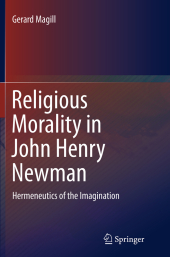 Neuerscheinungen 2016Stand: 2020-02-01 |
Schnellsuche
ISBN/Stichwort/Autor
|
Herderstraße 10
10625 Berlin
Tel.: 030 315 714 16
Fax 030 315 714 14
info@buchspektrum.de |

Gerard Magill
Religious Morality in John Henry Newman
Hermeneutics of the Imagination
Softcover reprint of the original 1st ed. 2015. 2016. xiv, 231 S. 235 mm
Verlag/Jahr: SPRINGER, BERLIN; SPRINGER INTERNATIONAL PUBLISHING 2016
ISBN: 3-319-36245-3 (3319362453)
Neue ISBN: 978-3-319-36245-8 (9783319362458)
Preis und Lieferzeit: Bitte klicken
This book is a systematic study of religious morality in the works of John Henry Newman (1801-1890). The work considers Newman´s widely discussed views on conscience and assent, analyzing his understanding of moral law and its relation to the development of moral doctrine in Church tradition. By integrating Newman´s religious epistemology and theological method, the author explores the hermeneutics of the imagination in moral decision-making: the imagination enables us to interpret complex reality in a practical manner, to relate belief with action. The analysis bridges philosophical and religious discourse, discussing three related categories. The first deals with Newman´s commitment to truth and holiness whereby he connects the realm of doctrine with the realm of salvation. The second category considers theoretical foundations of religious morality, and the third category explores Newman´s hermeneutics of the imagination to clarify his view of moral law, moral conscience, and Church tradition as practical foundations of religious morality. The author explains how secular reason in moral discernment can elicit religious significance. As a result, Church tradition should develop doctrine and foster holiness by being receptive to emerging experiences and cultural change. John Henry Newman was a highly controversial figure and his insightful writings continue to challenge and influence scholarship today. This book is a significant contribution to that scholarship and the analysis and literature comprise a detailed research guide for graduates and scholars.
1. Introduction
2. Truth and Holiness
2.1 Seeds of Conversion
2.1.1 External Pressures
2.1.2 Doctrine and Salvation
2.1.3 Reason and Conscience
2.2 Growth to Conversion
2.2.1 Dogmatic and Sacramental Principles
2.2.2 Principle of Economy
2.2.3 Patristic Influence
2.3 Hostility to Religious Liberalism
2.3.1 Liberalism as Rationalism
2.3.2 Doctrine and Salvation
2.3.3 Affinity with Liberal Catholics
2.4 Conclusion
3. Reason and Belief
3.1 Illative Sense.
3.1.1 Inference and Assent
3.1.2 Inductive Process
3.2 Sufficient Reasoning
3.2.1 Conditional Inference
3.2.2 Unconditional Assent
3.3 Newman´s Hermeneutics
3.3.1 Analogies
3.3.2 Role of the Will
3.4 Objective Truth
3.4.1 Subjective Process
3.4.2 Concrete and Abstract Reasoning
3.4.3 Exclusion of Doubt
3.5 Moral Demonstration
3.5.1 Moral Certitude
3.5.2 Practical Certainty
3.5.3 Normativity
3.6 Conclusion
4. Hermeneutics of the Imagination
4.1 Theory of Knowledge
4.1.1 Components of Knowledge
4.1.2 Role of Hypothesis
4.2 Moral Rhetoric
4.2.1 Interpretative and Assertive Roles
4.2.2 Creativity and Intensity
4.2.3 Imagination and Action
4.3 Theological Hermeneutics
4.3.1 Abstract and Concrete Reasoning
4.3.2 New Instrument for Theology
4.3.3 Notional and Real Assent
4.4 Theological History
4.4.1 Via Media
4.4.2 Development of Doctrine
4.4.3 Principle of Economy
4.5 Conclusion
Chapter 5. Moral Law
5.1 First Principles
5.1.1 Experience and Abstraction
5.1.2 Character and Assent
5.2 Meaning of Moral Law
5.2.1 Genesis of Moral Law
5.2.2 Application of Moral Law
5.3 Dispute Over Lying.
5.3.1 Cautious Dispensation of Truth
5.3.2 Just Cause
5.4 Refinement of Moral Law
5.4.1 Historical Consciousness
5.4.2 Interpretation of Moral Doctrine
5.5 Conclusion
-
Chapter 6. Moral Conscience
6.1 Moral Sense and Rationality
6.1.1 Informal Inference
6.1.2 Moral Certitude
6.2 Sense of Duty and Responsibility
6.2.1 Voice of God
6.2.2 Theonomous Autonomy
6.2.3 God, Truth, and Holiness
6.3 Conclusion
Chapter 7. Church Tradition
7.1 The Faithful and Theologians.
7.1.1 Consent of the Faithful
7.1.2 Freedom of Theologians
7.2 Church Magisterium
7.2.1 Church Teaching
7.2.2 Papal Infallibility
7.3 Truth and Holiness
7.3.1 Supremacy of Conscience
7.3.2 Patience, Silence, and Prayer.
7.4 Conclusion
Bibliography


